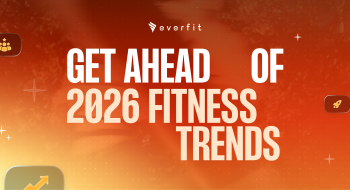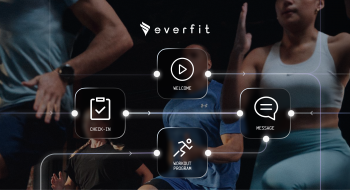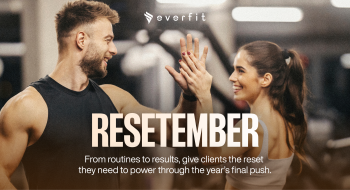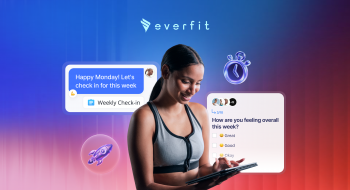Congratulations! You finally did it, you made the leap by launching your online coaching business. But the next step is a bigger challenge: whether you’re just certified or transitioning into online coaching, how do you get your first personal training clients when no one knows you yet?
Instead of throwing random tactics at the wall, let’s focus on five proven pillars: niche, branding, digital presence, marketing funnels, and referrals. This is how successful trainers consistently attract and retain clients.
Key takeaway
To get your personal training clients fast and effectively, it’s all about:
- Set your offer right with a clear, unique selling point.
- Prioritize your Personal Branding.
- Be where your clients are: Social Media, Organic Search, Community, etc
- Set up a simple marketing funnel with a free trial, a tiered package, a referral code, and free challenges.
If you want to encourage more gym showups, make “going to the gym” an easy task until it becomes a natural habit.
- Create beginner sessions that are easy to do.
- Encourage clients so they don’t feel shy or unmotivated.
- Approach them with natural guidance; don’t be too salesy. You want to impress them with your experience as a friend first, then as a coach.
How to pitch clients for personal training? Don’t be salesy. Be open to free guidance and willing to give away free sessions so they know what it’s like working with you first.
Set a Clear Unique Selling Proposition
Being “just another trainer” in a crowded fitness market won’t help you attract fitness clients. You must clearly define what sets you apart and be specific.
Ask yourself:
- Who do I enjoy working with the most? (busy professionals, new moms, athletes, seniors)
- What specific problem do I solve? (losing fat, building strength, training for marathons, post-pregnancy makeover)
- Where do I want to serve them? (in-person, online, hybrid)
From there, list your answer in one sentence with the value you can bring them. For example: “Busy moms in their 30s who want to lose weight without spending hours in the gym“.
Tip: You should highlight the benefit of “not spending hours in the gym” rather than the function of “losing weight.” All personal trainers can perform the same function, but their benefits are what stand out.
This is your Unique Selling Proposition (USP)—a clear statement of who you help, how you help them, and why they should choose you. As the foundation of your marketing, keep it clear, short, and result-driven.
Next, ensure your USP is visible everywhere and links to your name.
- Add it to your Instagram bio and website headline.
- Use it as the opening line when introducing yourself in person or online.
- Repeat it in your marketing content (videos, posts, email signature).
Tip: If you use a specific coaching method or specialized programs that are not very common or that you created, you can add them to your USP, too.
Build Your Personal Brand
Think of your personal brand as the reputation that works for you even when you’re not in the room. A strong brand identity helps you reach out to the right clients, build authority, and create a sense of recognition that keeps you top of mind.
This isn’t just your USP but expands to how you show yourself online and on social media. It’s your logo, brand color, and how you communicate with future clients.
Tip: It doesn’t have to look fancy or polished. What’s important is consistency. For example, if you are a female-only fitness coach, having soothing and welcoming pastel colors in your logo, social posts, or texts can be more captivating to them than black or hot red.
Where to find your personal training clients
Once you’ve got everything ready, it’s time to reach as many clients as possible, wherever they are. Here are some of the most common touchpoints:
1. Social media
Social media is the modern word-of-mouth marketing for trainers. The goal isn’t to be on every platform but to consistently show up where your ideal clients spend time.

However, don’t just post random workout clips. You need a system that builds trust, positions you as an expert, and nudges followers toward becoming clients.
Tip: Here are some ideas on what to post, ensuring your content is diverse, authentic, and establishes authority.
- Educational: This is where you show your expertise. Breaking down fitness myths or giving tips on workouts are the typical go-tos.
- Motivational: Your clients may experience inconsistency, doubt, or struggle to show up at the gym. Sharing a mindset tip or personal story can help them gain more confidence in changing their lifestyle.
- Social Proof: Client testimonial, before/after story, or shoutout.
- Behind the Scenes: Show your daily routine, how you prep, and your own training. Even the failed reps are counted.
- Call-to-Action Post: Free challenge or special offer that creates urgency.
Tip: To avoid sounding salesy, keep the 1-7 ratio. After 7 informative, high-quality posts, have a call-to-action or sale post.
Want to dive deep into social media strategy? These can help you quickly get clients on Instagram, Facebook, X, and many more.
- Blog: Strategies to Turn Social Media Into A Funnel Beyond the Likes
- Online course for fitness professionals: Amplify Your Brand: A 5-Day Framework for Social Media Success
2. Simple Website for Organic Search
Before thinking about building a website or setting up SEO (Search Engine Optimization) is too much to handle for a solo personal trainer; that is a big misconception.
There are many simple ways to make your online coaching or fitness business visible on the search, without spending thousands on an SEO agency.
- Set up a one-page site to introduce who you are and what package you are selling. Tools like Wix, Webflow, or even a coaching platform like Everfit can help with this!
- Set up your Google Business Profile (if you target in-person coaching) so people can search and find your gym. You can add photos, working hours, and client reviews.
3. Community
Sometimes the fastest way to get your first personal training clients is to show up in communities that already exist. By joining the right spaces, you position yourself as a trusted resource instead of “selling cold.”
Where to Find Communities:
- Online forums & groups: Facebook Groups (e.g., “Busy Moms Fitness,” “Running Clubs in [City]”), Reddit fitness communities, WhatsApp, Telegram group chat.
- Local communities: Gyms, yoga studios, CrossFit boxes, coworking spaces, or even running clubs.
- Wellness spaces: Nutritionists, physiotherapists, and chiropractors often have small communities where referrals flow naturally.
How to Contribute (Without Being Spammy):
- Engage first → Comment on questions, share helpful answers, be a friendly resource.
- Add value → Offer tips like quick workouts, stretching routines, or myth-busting advice.
- Build relationships → DM people who interact with you—not to sell, but to connect.
- Transition naturally → Once trust is built, invite them for a free consult or trial session.
After having your clients, you can set up an owned community to strengthen connection, accountability, and belonging. Building a community also helps you attract new personal training clients, since people naturally share experiences with friends when they feel part of something. Read on to maximize community power!
Build Simple Marketing Funnels
Don’t rely on random posts if you want to get your personal training clients fast. You need simple, repeatable funnels that move people from discovery → trust → signup.
Below are some plug-and-play strategies that combine lead generation for personal trainers, email nurturing, and a personal trainer referral program—all doable with Everfit.
Free trial

The first step is creating opportunities for new people to discover you and try your coaching without risk.
Start with a two-week free trial for clients to give them enough time to experience your coaching style and develop a habit with you. They will be less willing to give up their new workout routine provided through your online coaching.
Tip: Learn how to Set up a Free Trial Package quickly and automatically on Everfit. With ease, you can automate the delivery of training, nutrition, and habits to one or even multiple clients while keeping track of their data and sales performance.
Challenges and Community Forums
Offering something as simple as a lifting challenge or 30-day fitness challenge gives potential personal training clients a taste of online programming while still driving revenue for you.
Traditionally, many fitness coaches run fitness challenges on Facebook Groups and then manually tally all the scores at the end. Does this sound like lots of work? Everfit does the heavy lifting for you with Forum and Leaderboard features!

Live Q&A Sessions
Host weekly Instagram Lives or Zoom sessions where you answer fitness questions. Position yourself as approachable and credible, while building an audience that trusts you.
Share case studies and testimonials
Once someone shows interest, your job is to keep them engaged and position yourself as the obvious solution. Share case studies and testimonials to show how other clients work with you. Not just the result but also the overall experience, such as when they failed to do reps, and even a small win like doing a push-up.
Offer low-ticket to high-ticket offers.
Creating a clear offer ladder is one of the most innovative ways to attract and retain personal training clients. This means giving people multiple entry points to start small, build trust, and eventually upgrade to higher-value coaching. At the same time, you keep a safety net for those who can’t stay on premium packages by scaling them back to lower-cost programs instead of losing them.
Here’s an example:
Low-ticket starter: Not every lead is ready to commit to $200+ per month immediately. So, I created a low-ticket starter for around $39 per month for a training and nutrition plan, but with limited personalization. I have a weekly check-in to see how they feel and if they need any support, all automated with Everfit.
High-ticket upsell: Once they complete a low-ticket program and see results, it’s the perfect time to invite them into my premium coaching offer. They have understood my coaching style and felt connected with me as a fitness coach.
Back to low-ticket recurring subscription: Not every client will stay on high-ticket coaching forever. But instead of letting them churn, I offer a scaled-back option so they remain. I offer them on-demand resources that they can self-practice anytime, plus an engaging community to still join a challenge and meet other clients.
This is how Rachel Henley monetizes her online presence to convert it into 5,000 clients. Read her story.
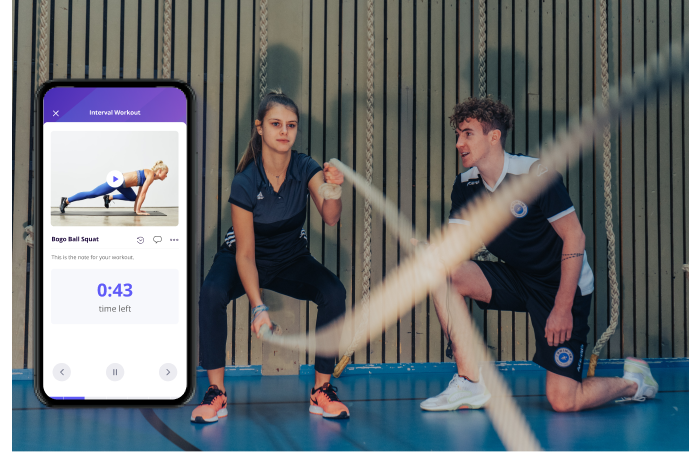
Leverage Referral
They likely heard praise about you from somebody they respect; that’s worth its weight in gold. A simple referral system would offer a month of free coaching for every new referral that signs up.
Oftentimes, people will look to family and friends for referrals. Lean on your long-term clients to recommend a friend struggling with their fitness.
Upgrade Your Training Experience
Today’s clients expect more than spreadsheets and email workouts. They want a seamless experience that feels professional and personalized.
With Everfit, you don’t just use another platform—you can launch a fully branded fitness app under your name, logo, and colors.

Remember that online training is still relatively new. People often don’t know what they’re getting regarding online training, and they assume it will be challenging to navigate. Show them how easy it is by running it yourself and explaining it to them first-hand.
Wrapping Up
Getting your first 10 personal training clients is less about luck than building the right systems. By defining your niche, building a personal brand, establishing a digital presence, creating simple funnels, and structuring offers from low to high, you give prospects multiple ways to discover you, trust you, and commit to your coaching.






